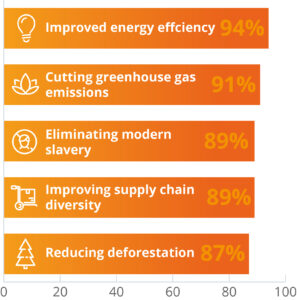The pressure on companies worldwide to care more about their environmental, societal and governance strategy (ESG) is on, and it comes from various directions: from the directors, clients, employees, and investors. To handle it at the required speed, organisations must look not only at their own companies but also into their procurement teams, making sure they choose suppliers that take those aspects as seriously as they do.
What is ESG and why is it so important?
As stated by Investopedia, environmental, social, and governance criteria, known as ESG, are a set of standards for a company’s behaviour used by socially conscious investors to screen potential investments. Those criteria help establish whether a company is having the right environmental impact and to what extend it cares about it.
It has been proved that a strong ESG proposition creates value and, as stated by McKinsey (1), is linked directly to cash flow by:
- facilitating top-line growth,
- reducing costs,
- minimising regulatory and legal interventions,
- increasing employee productivity,
- optimising investment and capital expenditures.
| Benefits of strong ESG proposition (2) | Strong ESG proposition (examples) | Week ESG proposition (examples) |
| Top-line growth | Attract B2B and B2C customers with more sustainable products
Achieve better access to resources through stronger community and government relations |
Lose customer through poor sustainability practices (eg. human rights, supply chain) or a perception of unsustainable/unsafe products
Lose access to resources (including operational shutdowns) as s result of poor community and labor relations |
| Cost reductions | Lower energy consumption
Reduce water intake |
Generate unnecessary wast and pay correspondingly higher waste-disposal costs
Expend more in packaging costs |
| Regulatory and legal interventions | Achieve greater strategic freedom through deregulation
Earn subsidies and government support |
Suffer restriction on advertising and point of sale
Incur fines, penalties, and enforcement actions |
| Productivity uplift | Boost employee motivation
Attract talent through grater social credibility |
Deal with “social stigma”, which restricts talent pool
Lose talent as a result of weak purpose |
| Investment and asset optimisation | Enhance investment returns by better allocating capital for the long term (eg. more sustainable plant and equipment)
Avoid investments that may not pay off because of long-term environmental issues |
Suffer stranded assets as a result of premature write-downs
Fall behind competitors that have invested to be less “energy hungry” |
Research confirms that companies around the world take ESG more and more seriously. For UK businesses for example their main goals are improving energy efficiency, cutting greenhouse gas emissions and eliminating modern slavery.
Top ESG priorities for UK businesses (3):

The impact of procurement on sustainability
While it is often easiest to start with one’s own ESG policies, many businesses miss the fact that one of the most effective ways to get to grips with ESG strategy is to build intelligent supply chains. As proved by Boston Consulting Group (4), 80 to 90% of greenhouse-gas emissions are indirect, and two-thirds of them come from their direct and n-tier suppliers and subcontractors throughout their supply chain.
Sustainability and the procurement of software services
When thinking about sustainable procurement, people usually think of procurement of physical products. However, the benefits of the ESG application in the selection and purchase of services, including software development, is undeniable.
The benefits of collaboration with responsible suppliers include:
- better performance,
- making a significant difference to the communities around the world,
- meeting requirements of the customers who are keen to choose products created by brands they consider sustainable.
The conclusion? If you include your suppliers in your ESG strategy, you will minimise your ESG footprint to a much greater extend!
Implementing ESG strategy in service procurement
Implementing ESG strategy in an organisation is a complex project that needs a plan, a champion, proper objectives, and deadlines. When that’s done, you need to look at the list of your suppliers and check what they do in terms of ESG. Do they care about environment and their carbon footprint? What’s their vision and approach to sustainability? How can they help you achieve your ESG objectives? Speak to them about what you expect and where you want to be. Check whether you can achieve your plans together.
Despite the obvious benefits of collaborating with partners who take ESG seriously, research shows (5) that 73% of UK businesses cannot tell if their closest supply chain partners are meeting any kind of ESG standards, while 63% say they don’t even have an effective risk management system to guarantee the ESG integrity of their partners. As their top three barriers to assessing ESG risk of supply chain partners they list:
- lack of data on suppliers’ ESG credentials,
- limited financial resources,
- reliance on technology not designed for complying with ESG standards.
To speed up sustainability efforts and prove to their stakeholders that they take ESG seriously, companies need to review their current list of partners by doing ESG assessments and put pressure on their suppliers to introduce or improve their actions for sustainability.
Choosing a sustainable partner for technology services
Rule no 1 – do your homework and take time to research. What you may find helpful for both prospective and current collaborations with technology consultancy and software delivery partners is this Due Diligence Questionnaire which contains some basic questions about the CSR practices.
As a relatively new area, the depth and coverage of sustainability practices varies across organisations. For example, at Future Processing we run a number of internal initiatives but also work on environmentally-focused projects with our clients.
One of the main objectives is to systematically reduce our negative impact on the environment. Actions we undertake include saving power and water, collecting used batteries, lightbulbs and electronic devices, collecting and donating plastic bottle caps, providing a bike repair station, electric vehicle charging points and a free rental service for camping equipment. Our focus is on putting people first and this means being a fair and responsible employer, business partner, and member of the wider society which translates into various actions and charitable initiatives.
It is worth remembering that beyond sustainability, there are many areas to investigate when choosing new technology partners. Yet, a good choice means companies we collaborate with are responsible and sustainable which is a contribution towards the wellbeing of the society and the planet.
Sources:
(1), (2) https://www.mckinsey.com/business-functions/strategy-and-corporate-finance/our-insights/five-ways-that-esg-creates-value
(3), (5) https://get.coupa.com/rs/950-OLU-185/images/ESG-Risk-Supply-Chain_UK.pdf
(4) https://www.bcg.com/publications/2021/fighting-climate-change-with-supply-chain-decarbonization
